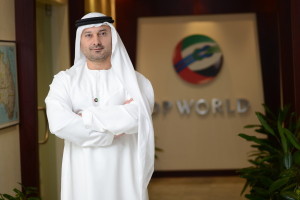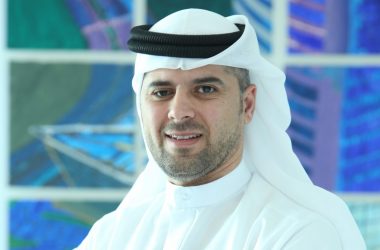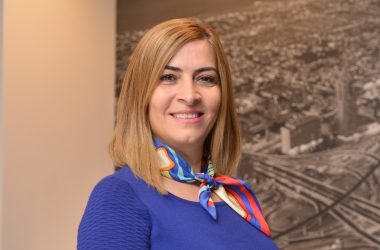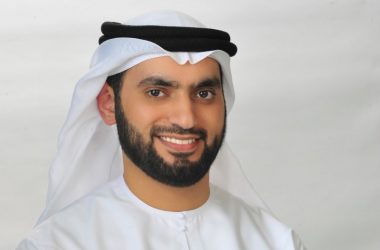
Almutawa did not intend on becoming a CIO, though from an early age he had an interest in technology. He spent his youth between Bahrain and the UAE and remembers fondly playing a bit of Pong on an early gaming machine.
When he was 11, in 1983, he received his first major piece of technology, a Commodore 64 – the kind that still used tapes as storage. However, Almutawa’s true involvement with technology came later, as a result of his endless drive to do what he does best – reach out to people.
He showed an early interest in physics and maths, as well as space and sci-fi. “I remember reading about things like light speeds and Einstein’s theory of relativity, and thinking that they were science fiction,” he says. As he studied more, however, he realised that these things were actually possible and real, and his passion was ignited. “To me it wasn’t science fiction anymore, I knew that these things were true and I imagined myself in a world where I could use technology like that.”
Still, his interest in science trumped his interest in technology when it came time to choose his university degree. His father, a lawyer, supported his decision to go into medicine. He was accepted, on a scholarship, to an extremely competitive programme in a preparation course for the Royal College of Surgeons in Ireland directly after secondary school in 1990. “My English was weak,” he says in his now perfected accent, “and the programme was very competitive.”
After a year and a half in Ireland, he decided that medicine simply was not for him. He changed not only his course, but his country. “So that I could keep my scholarship, I changed from medicine to engineering, and moved from Ireland to the US,” Almutawa explains. “I loved Ireland, but to be honest, I was tired of the rain and the cold.”
His first stop off in the United States was Richmond, Virginia, in February of 1992. After six months of acclimatising to the culture and working on his language skills, he left the east coast for sunny California. Almost as if fated, he met three Arab students living in Virginia who had also studied in Ireland.
In the Spring of 1992, he and his friends enrolled in California State University in Chico, California. There, he began a course in Electrical and Electronic Engineering. “The work was very challenging,” says Almutawa. “I remember studying very hard during that time. While all the business and marketing guys were out partying, we from the Engineering college were in the library.”
In that library in 1993, Almutawa discovered a resource that would change the course of his career. “It was there that I began using the Internet for research. I was using LexisNexis when I realised that I could use the Internet to reach out to other people.” At the time, the Internet did not have a friendly user interface, but attracted to the idea of connecting with information from around the world, Almutawa set to learning a few commands.
“I could read news directly from the source, with no filter,” he says of the early days of the Internet, “I could also talk to my family using IRC chat rooms, as well as meet people from around the world.” Admittedly, Almutawa says, he became addicted to social interactions on the web before social media even had a presence. “To be fair, though, it stopped there,” he says. “I don’t even have a Facebook account these days.”
Then in 1994, Almutawa transferred just down the road to the University of California campus in Sacramento, California to continue his studies in engineering. “I wanted to focus on power generation, so when I completed, I also earned a certificate in that field,” he says of his transfer.
Upon graduation in 1996, he had every intention of returning to the UAE. However, during his last year of study, he had met a group of seven students that had an idea. The idea was to start an Internet Service Provider. “These guys were providing Internet over 14.4k dial-ups to consumers in Sacramento as well as connectivity projects for companies,” he says. Almutawa, however, was to face a big learning curve. He hadn’t studied these things, and so at the company, InterX, he had to learn on the go.
He began in a technical support position, but with only seven people on staff, he was actually doing a number of things. “I was picking up phones for technical support, performing system administration duties, and even mopping floors,” he says. It was the days of the Internet revolution, and the group truly felt that they were changing the world. As with many start-ups of the time, employees were paid in shares.
The start-up did well, taking on system integration projects, building e-commerce shops and even creating Internet banking software. By 1999, they had grown into a team of 17. Unfortunately, just as the company was going to go public in 2000, the Internet bubble burst. Though the company disbanded and its employees scattered, Almutawa left with a wealth of lessons. “I learned what it meant to be in a start-up environment,” he says, “and I learned what it takes to make a business run.”
With these lessons learned, he moved on to another California-based company, Synergex. He was hired as an e-business consultant. His role was to perform system integration for companies with legacy systems that needed to get on board with the Internet and with mobile applications. Through his interactions with Synergex clients, he learned about other industries and how they do business.
Finally, in August 2001, he made his return to the UAE and was quickly hired at a branch of the Dubai government that had only just opened – Dubai eGovernment. Though Dubai eGovernment was a government agency, to Almutawa, the environment was akin to the start-ups that he was used to. As the Manager of Technology and Information, he established the IT infrastructure and systems integration architecture models for a number of government departments.
In 2003, Almutawa moved on to Dubai Internet City telecoms department as a Program Manager. “Dubai Internet City had promised to provide certain services,” he says of his projects. “We had to meet with developers to ensure that things like connectivity could be rolled out.” Dubai was booming with construction at the time, and Almutawa had to manage the teams that were in charge of making sure that the brief could be met. “It was almost like I was in a start-up again,” he says, “I felt like I was part of the team that was building Dubai.” These days, when he walks past landmarks like the Burj Khalifa, he knows that he was part of making the dream of Dubai come true. “I feel lucky that I was a part of the Internet boom, and then also part of the Dubai boom as well,” he says.
At the end of 2005, a new company was formed. du was to become one of the main telecom providers in the UAE. The telecom department was acquired by du at that time. Almutawa continued with du implementing fixed line projects. By 2008, du and his department were stable, and it was time for Almutawa to take on a new challenge.
That new challenge came in the form of DP World. When he began at the ports management company, there was no CIO. There had not been a CIO for two years, and Almutawa took on the role. “They hired me because I could think outside the box,” he says, “I wasn’t from the port industry, and they wanted fresh eyes.”
From 2009 to 2012, Almutawa was secounded by Dubai World Holding Company. “After the crisis, there was a lot of restructuring going on,” he recalls, “and I needed to change the shared services department from a cost centre to a profit centre.” As such, he changed the culture of the company, shifting the way that they were thinking about IT. “The role of IT has completely changed,” he says, “people can do basic tasks for themselves. You have a lot of business people becoming IT savvy.”
In 2012 he returned to DP World and brought with him his spirit of innovation. In addition to running the technology infrastructure of DP World, he has brought his start-up savvy to secondary projects. As the Accelerator Program Director for DP World-funded seed accelerator TURN8, Almutawa has put himself back in the start-up game. “TURN8 is designed to encourage innovative entrepreneurship worldwide,” he explains. “We look for people with new ideas that can be refined and brought to market. The program then selects start-up teams with marketable ideas and supports them with funding, mentoring and training.”
The idea is to give young innovators a chance to make their business work. “We provide a great space,” says Almutawa, “where our teams can simply work, and dedicate their time to their ideas.” In short, he says, TURN8 is like a boot camp for start-ups.
Almutawa seems to be a master of turning crashes into booms and failures into successes. He continually reaches out to people to encourage them to fulfil their potential. Perhaps it was the Internet crash, or perhaps it began earlier on in his history, but Almutawa is a CIO that can turn any situation on its head and make it positive.





